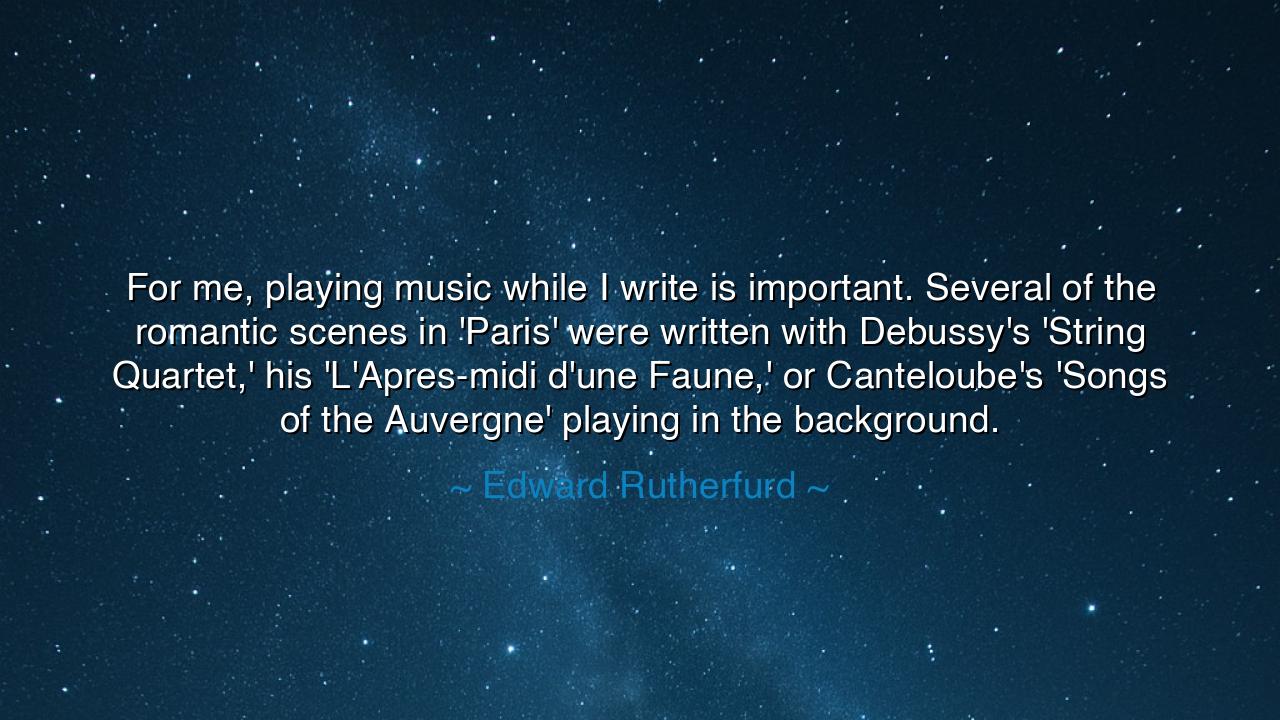
For me, playing music while I write is important. Several of the
For me, playing music while I write is important. Several of the romantic scenes in 'Paris' were written with Debussy's 'String Quartet,' his 'L'Apres-midi d'une Faune,' or Canteloube's 'Songs of the Auvergne' playing in the background.






“For me, playing music while I write is important. Several of the romantic scenes in ‘Paris’ were written with Debussy’s String Quartet, his L’Après-midi d’un Faune, or Canteloube’s Songs of the Auvergne playing in the background.” Thus speaks Edward Rutherfurd, weaving into his confession a truth that spans centuries: that music is not merely sound, but a companion to creation, a vessel for emotion, and a key that unlocks the doors of imagination. What he reveals is the marriage of two great arts—song and story—each feeding the other, each carrying the soul to heights unreachable alone.
In these words we glimpse the power of music to summon atmosphere, to clothe the bare bones of thought in robes of passion. Rutherfurd, crafting his tale of Paris, does not rely on words alone. He calls upon Debussy, whose String Quartet thrums with longing, and upon L’Après-midi d’un Faune, a dreamscape of sensuality that drifts between waking and sleep. With these melodies circling his mind, the writer finds himself not in silence, but in communion with spirits of sound who whisper the essence of romance, the fragrance of desire, the heartbeat of the city itself.
The ancients knew well this alliance of music and poetry. Recall Homer, who sang his epics to the strum of the lyre. Without melody, his verses would have been mere utterance; with melody, they became immortal, passed from tongue to tongue across generations. Or consider Sappho, whose love poems were once sung to the pluck of strings, her words carried on waves of music that deepened their tenderness. Rutherfurd’s practice is but a continuation of this ancient union, a reminder that writing in silence is like painting without color.
Even in history’s greatest moments, music has guided the hand of creation. Beethoven, though nearly deaf, pressed his ear to the piano and composed symphonies that shook the heavens. His music carried the weight of revolutions, inspired poets and painters, and stirred entire nations to new visions of freedom. If Beethoven’s melodies could birth courage and hope, why should they not also infuse a novelist’s pen with passion? Rutherfurd understood this: that to conjure romance upon the page, one must first let romance flow into the heart through song.
There is a lesson here for all who labor in the arts, or in any craft of the soul. Surround yourself with that which elevates you. Do not work in barren silence if melody can awaken fire. Do not scorn the company of music, for it is a guide, a tutor, a companion that lifts the mind above the dull weight of habit. Let Debussy stir your imagination, let the folk songs of the Auvergne remind you of the earth’s simple beauty, let the sounds of flutes, strings, and voices become co-authors in your work.
But the teaching extends beyond artists alone. For even those who do not write novels may still find in music a way to enrich their lives. When you labor, let harmony soften the burden. When you love, let melody heighten the sweetness. When you mourn, let song give voice to sorrow too heavy for words. Music is not only for the stage or the scholar—it is the companion of all humanity, echoing the rhythms of our beating hearts.
Therefore, let this wisdom be carried forth: do not silence the power of music in your life. Use it to awaken your imagination, to deepen your emotions, to give shape to the formless. Just as Rutherfurd wrote of Paris with the voices of Debussy and Canteloube guiding his hand, so may you write the chapters of your own life with a soundtrack that lifts the soul. For in the end, words may tell the story, but it is music that gives the story wings.






AAdministratorAdministrator
Welcome, honored guests. Please leave a comment, we will respond soon